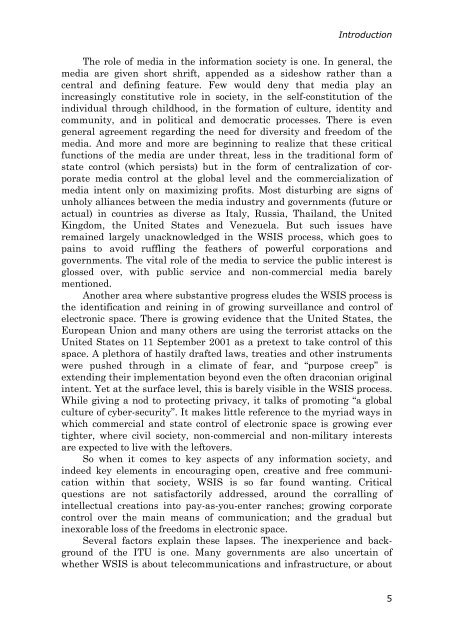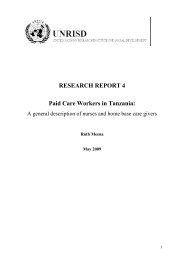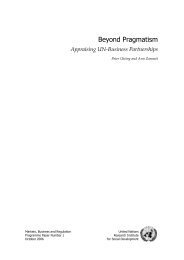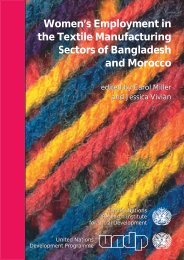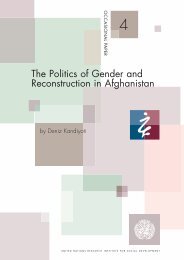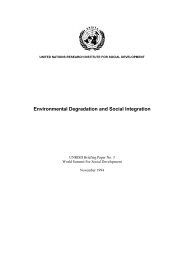communicating in the information society - United Nations Research ...
communicating in the information society - United Nations Research ...
communicating in the information society - United Nations Research ...
Create successful ePaper yourself
Turn your PDF publications into a flip-book with our unique Google optimized e-Paper software.
Introduction<br />
The role of media <strong>in</strong> <strong>the</strong> <strong>in</strong>formation <strong>society</strong> is one. In general, <strong>the</strong><br />
media are given short shrift, appended as a sideshow ra<strong>the</strong>r than a<br />
central and def<strong>in</strong><strong>in</strong>g feature. Few would deny that media play an<br />
<strong>in</strong>creas<strong>in</strong>gly constitutive role <strong>in</strong> <strong>society</strong>, <strong>in</strong> <strong>the</strong> self-constitution of <strong>the</strong><br />
<strong>in</strong>dividual through childhood, <strong>in</strong> <strong>the</strong> formation of culture, identity and<br />
community, and <strong>in</strong> political and democratic processes. There is even<br />
general agreement regard<strong>in</strong>g <strong>the</strong> need for diversity and freedom of <strong>the</strong><br />
media. And more and more are beg<strong>in</strong>n<strong>in</strong>g to realize that <strong>the</strong>se critical<br />
functions of <strong>the</strong> media are under threat, less <strong>in</strong> <strong>the</strong> traditional form of<br />
state control (which persists) but <strong>in</strong> <strong>the</strong> form of centralization of corporate<br />
media control at <strong>the</strong> global level and <strong>the</strong> commercialization of<br />
media <strong>in</strong>tent only on maximiz<strong>in</strong>g profits. Most disturb<strong>in</strong>g are signs of<br />
unholy alliances between <strong>the</strong> media <strong>in</strong>dustry and governments (future or<br />
actual) <strong>in</strong> countries as diverse as Italy, Russia, Thailand, <strong>the</strong> <strong>United</strong><br />
K<strong>in</strong>gdom, <strong>the</strong> <strong>United</strong> States and Venezuela. But such issues have<br />
rema<strong>in</strong>ed largely unacknowledged <strong>in</strong> <strong>the</strong> WSIS process, which goes to<br />
pa<strong>in</strong>s to avoid ruffl<strong>in</strong>g <strong>the</strong> fea<strong>the</strong>rs of powerful corporations and<br />
governments. The vital role of <strong>the</strong> media to service <strong>the</strong> public <strong>in</strong>terest is<br />
glossed over, with public service and non-commercial media barely<br />
mentioned.<br />
Ano<strong>the</strong>r area where substantive progress eludes <strong>the</strong> WSIS process is<br />
<strong>the</strong> identification and re<strong>in</strong><strong>in</strong>g <strong>in</strong> of grow<strong>in</strong>g surveillance and control of<br />
electronic space. There is grow<strong>in</strong>g evidence that <strong>the</strong> <strong>United</strong> States, <strong>the</strong><br />
European Union and many o<strong>the</strong>rs are us<strong>in</strong>g <strong>the</strong> terrorist attacks on <strong>the</strong><br />
<strong>United</strong> States on 11 September 2001 as a pretext to take control of this<br />
space. A plethora of hastily drafted laws, treaties and o<strong>the</strong>r <strong>in</strong>struments<br />
were pushed through <strong>in</strong> a climate of fear, and “purpose creep” is<br />
extend<strong>in</strong>g <strong>the</strong>ir implementation beyond even <strong>the</strong> often draconian orig<strong>in</strong>al<br />
<strong>in</strong>tent. Yet at <strong>the</strong> surface level, this is barely visible <strong>in</strong> <strong>the</strong> WSIS process.<br />
While giv<strong>in</strong>g a nod to protect<strong>in</strong>g privacy, it talks of promot<strong>in</strong>g “a global<br />
culture of cyber-security”. It makes little reference to <strong>the</strong> myriad ways <strong>in</strong><br />
which commercial and state control of electronic space is grow<strong>in</strong>g ever<br />
tighter, where civil <strong>society</strong>, non-commercial and non-military <strong>in</strong>terests<br />
are expected to live with <strong>the</strong> leftovers.<br />
So when it comes to key aspects of any <strong>in</strong>formation <strong>society</strong>, and<br />
<strong>in</strong>deed key elements <strong>in</strong> encourag<strong>in</strong>g open, creative and free communication<br />
with<strong>in</strong> that <strong>society</strong>, WSIS is so far found want<strong>in</strong>g. Critical<br />
questions are not satisfactorily addressed, around <strong>the</strong> corrall<strong>in</strong>g of<br />
<strong>in</strong>tellectual creations <strong>in</strong>to pay-as-you-enter ranches; grow<strong>in</strong>g corporate<br />
control over <strong>the</strong> ma<strong>in</strong> means of communication; and <strong>the</strong> gradual but<br />
<strong>in</strong>exorable loss of <strong>the</strong> freedoms <strong>in</strong> electronic space.<br />
Several factors expla<strong>in</strong> <strong>the</strong>se lapses. The <strong>in</strong>experience and background<br />
of <strong>the</strong> ITU is one. Many governments are also uncerta<strong>in</strong> of<br />
whe<strong>the</strong>r WSIS is about telecommunications and <strong>in</strong>frastructure, or about<br />
5


